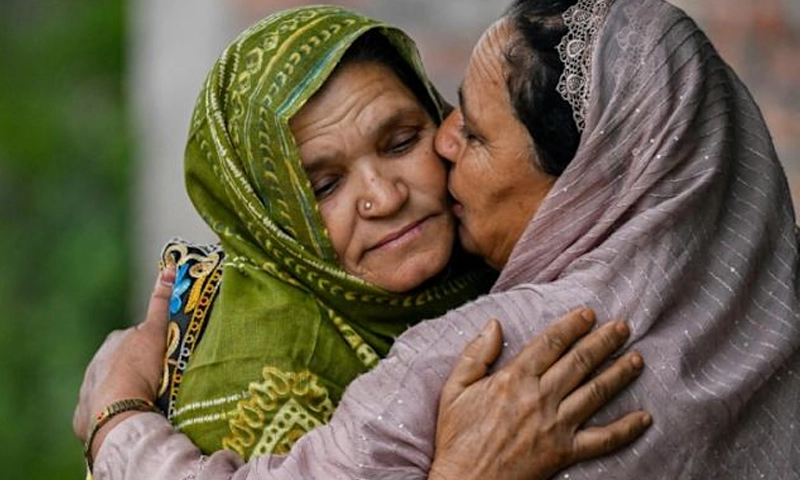- Web Desk
- Feb 24, 2026
Between India and Pakistan, families divided by Kashmir
-

- AFP
- May 06, 2025

SRINAGAR: Four decades after she moved to India from Pakistan, got married and had six children, Nasreen Akhtar Bi’s life was upended — a case illustrating in one family the fractured history of contested Kashmir.
Bi, 55, was not caught up in the April 22 attack in Indian-administered Kashmir when gunmen targeting tourists killed 26 mainly Hindu men, killings that New Delhi blames on its arch-rival Islamabad. Pakistan rejects the accusations.
But the furious arguments since have triggered regular gunfire between their troops along the de facto frontier in Kashmir and sweeping tit-for-tat punitive diplomatic sanctions — including cancelling visas.
Bi and her family, living in the usually sleepy farming village of Salwah in the Himalayan hills under Indian control, were dragged into a bitter quarrel between the leaders of the nuclear-armed nations.
She, her four brothers and four sisters, were detained by police and taken to the border with Pakistan.
“It was a very big shock,” Bi said. “I did not know what to do, I was shivering with chills and fever all over my body.”
India and Pakistan have fought multiple times since the violent end of British rule in 1947, when colonial officers drew straight-line borders on maps to partition the nations, dividing communities.
Muslim-majority Kashmir — claimed by both India and Pakistan — has been a repeated flashpoint.
Rebels in the Indian-run area of Jammu and Kashmir have waged an insurgency since 1989, seeking independence or a merger with Pakistan.
During previous conflict in 1965, her parents had fled fighting — and ended in Pakistan-controlled Kashmir.
But in 1982, when borders eased, they returned to the Indian side.
“All their lands, family roots and history were here,” said Bi’s older sister, Nasheen Akhtar, 60.
Akhtar’s son, Faisal Majeed, 35, said they were shocked at the attack at Pahalgam, but had not thought it would impact them.
“When the civilians were killed in Kashmir and our government announced expulsions, we didn’t think it could have a direct bearing on us,” said Majeed, Bi’s nephew.
“It was like a ton of bricks had fallen on me.”
Many of their neighbours were unaware of their family history.
Bi arrived at the border with Pakistan, a place she barely has a memory of.
“I’ve never been there since I came here with my late parents as a child,” she said. “All my siblings, family and relatives are here.”
Bi said she understood the angry grief in response to the Pahalgam attack but that it was ordinary people like her who were suffering in the sweeping response.
“I felt the pain for the people killed,” she said. “I also feel for those who’re being asked to leave after all these years.”
But as Bi and her siblings readied to cross into Pakistan, a last minute Indian court order stopped their expulsion.
“Thank God, it didn’t happen,” Bi’s husband Fazal Hussain said, sitting alongside his wife on the veranda of their simple hillside home.
“We’d all have been orphaned,” 65-year-old Hussain said, with a long grey beard. “I’d have been just as lost here as she’d have been there, alone on the other side.”
Bi is now back home on her farm, in Indian-run Jammu and Kashmir.
The wider situation remains a concern.
UN chief Antonio Guterres said on Monday relations between Pakistan and India had reached a “boiling point”, warning that “now is the time for maximum restraint and stepping back from the brink”.
India’s army said on Tuesday its troops had exchanged gunfire with Pakistani soldiers overnight across the Line of Control in multiple sites, which it says has taken place every night since April 24.
That includes gunfire near Bi’s home village.
But for Bi and her family, her return was something to celebrate.
“I realised I was home after I saw my buffaloes, goats and my husband, who cried with joy and put a garland of flowers on me,” she said.
Kashmir prepares for tourism ‘long lull’ as war cries ring loud




